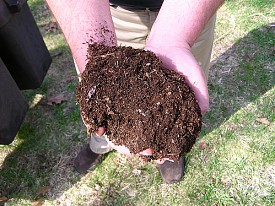Heat Up the House With Compost
 When compost breaks down, one byproduct is a lot of heat ... so much heat that you can actually cook with it. Students at the University of Vermont started wondering why that heat should go to waste. Their solution? Loop coil heating systems, where tubes of water are run through the compost pile, heating the water so it can be used for various purposes around the home, garden, barn, and stable. Pretty cool -- or should we say warm -- right? Using compost for residential heating represents an excellent method of trapping what would otherwise be waste heat, and it's totally free.
When compost breaks down, one byproduct is a lot of heat ... so much heat that you can actually cook with it. Students at the University of Vermont started wondering why that heat should go to waste. Their solution? Loop coil heating systems, where tubes of water are run through the compost pile, heating the water so it can be used for various purposes around the home, garden, barn, and stable. Pretty cool -- or should we say warm -- right? Using compost for residential heating represents an excellent method of trapping what would otherwise be waste heat, and it's totally free.
Here's how it works
Begin by building a large, sloping compost pile. Run appropriately durable tubing through it, arranged in loops to increase the tubing surface area exposed to the heat at the pile's interior. As you build up the compost, the inside can reach anywhere from 130 to 160 degrees, well above the recommended heat for cooking and bathing. The nice, toasty water can be routed straight into your house, where it can do a number of fantastic things.
Compost-heated floors
For starters, find an HVAC technician to set up a compost heating system that will run the heated water through coils in the floor, heating your floors and your home. When the water starts to cool off, it may be shunted back to the compost pile to heat up again and keep that warmth circulating. This is a great way to handle cold days and keep the internal temperature of a house nice and stable. In addition, a Phoenix plumber can run that hot water to your taps for washing and bathing so you'll save energy on heating water.
Methane power
For extra credit, install a manure tank in the middle of your compost pile to generate methane, which you can use for heating, cooking, and even running cars. That's what Jean Pain did when he pioneered a compost heating system in the 1970s in France, demonstrating that it was practical, possible, and ecologically friendly to heat a home with kitchen scraps and other organic waste. His model is still used around the world, and it's being subjected to continuous improvements to make it even better.
Commercial possibilities
There are tons of ways to heat a home with compost, and it can also be employed on an industrial and commercial scale. Commercial greenhouses, for example, could use compost to help maintain stable temperatures in the winter when they'd otherwise need artificial heating to keep temperatures up for hothouse food production.
Sound weird? Or potentially stinky? Compost has been used as a heat source for a long time, thanks to the fact that a healthy, well-balanced compost pile should have a mix of hot little organisms living inside (by the way, healthy compost also isn't smelly!). Why pay to heat water when you can do it for free?
Katie Marks writes for Networx.com.
Updated December 5, 2018.
Looking for a Pro? Call us (866) 441-6648

Heating & cooling Average Costs
HVAC Contractors Experiences

Successful Removal Of A Very Large Tree

Rock Landscaping Adds Curb Appeal To An Arizona Home



